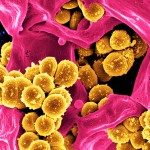Lien vers Pubmed [PMID] – 31000797
Genes Immun. 2019 05;20(5):415-425
Chronic inflammatory diseases such as rheumatoid arthritis, inflammatory bowel disease, spondyloarthritis, and psoriasis cause significant morbidity and are a considerable burden for the patients in terms of pain, impaired function, and diminished quality of life, as well as for society, because of the associated high health-care costs and loss of productivity. Our limited understanding of the pathogenic mechanisms involved in these diseases currently hinders early diagnosis and the development of more specific and effective therapies. The past years have been marked by considerable progress in our insight of the genetic basis of many diseases. In particular, genome-wide association studies (GWAS) performed with thousands of patients have provided detailed information about the genetic variants associated with a large number of chronic inflammatory diseases. These studies have brought to the forefront many genes linked to signaling pathways that were not previously known to be involved in pathogenesis, pointing to new directions in the study of disease mechanisms. GWAS also provided fundamental evidence for a key role of the immune system in the pathogenesis of these diseases, because many of the identified loci map to genes involved in different immune processes. However, the mechanisms by which disease-associated genetic variants act on disease development and the targeted cell populations remain poorly understood. The challenge of the post-GWAS era is to understand how these variants affect pathogenesis, to allow translation of genetic data into better diagnostics and innovative treatment strategies. Here, we review recent results that document the importance of the IL-23/IL-17 pathway for the pathogenesis of several chronic inflammatory diseases and summarize data that demonstrate how therapeutic targeting of this pathway can benefit affected patients.

